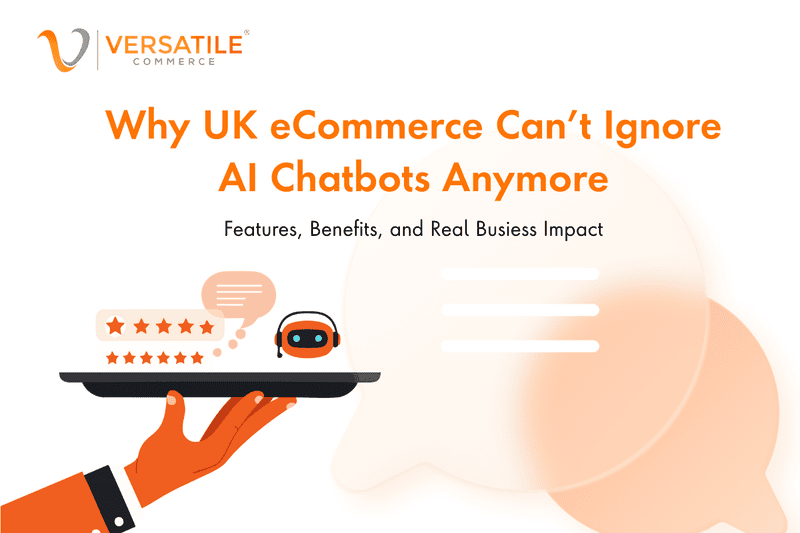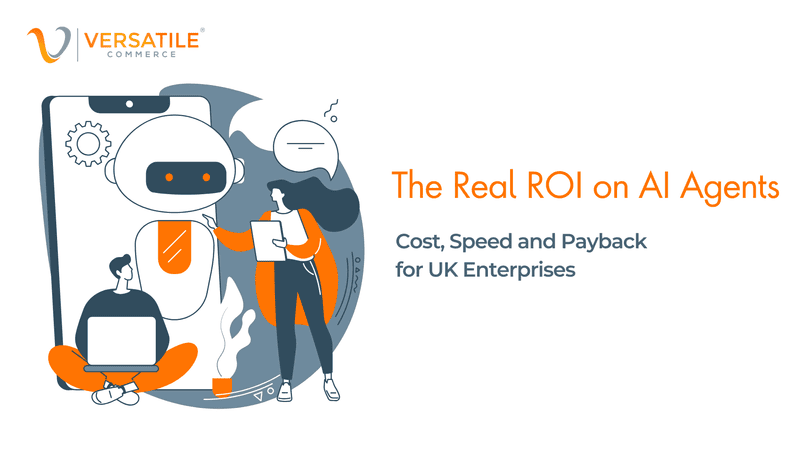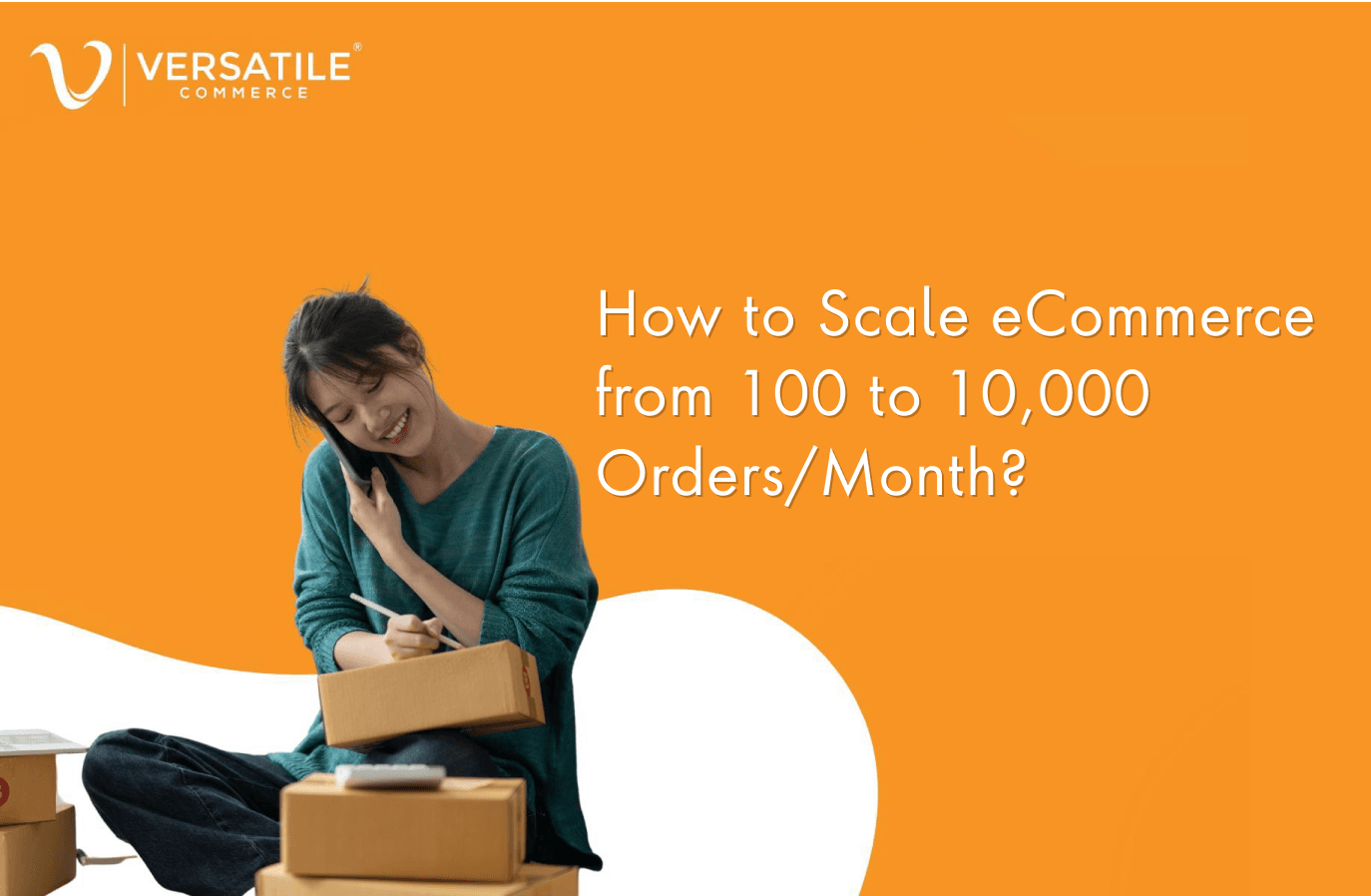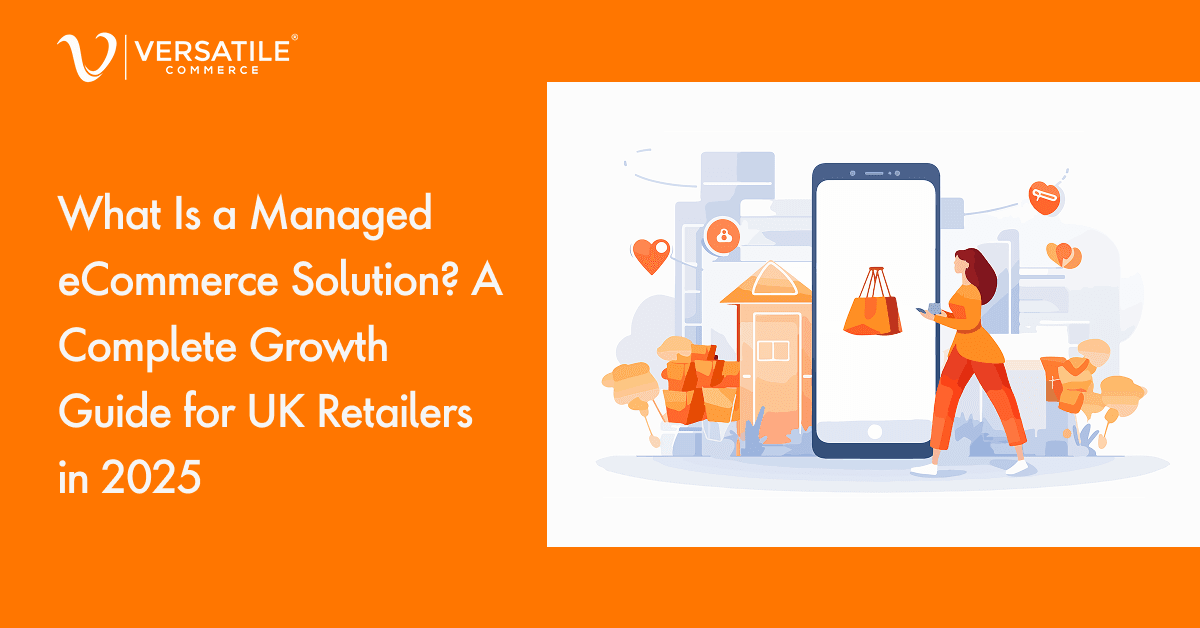
The UK retail landscape is shifting. Are you ready for what’s next?
The UK retail sector is undergoing a profound transformation driven by surging consumer expectations, rapid digitisation, and a competitive need for scalable innovation. With over three million people employed across more than 235,000 enterprises, retail remains a vital contributor to the nation's economic framework. But in today’s dynamic environment, maintaining market relevance requires more than just an online shopfront.
Post-pandemic acceleration has redefined how consumers discover, shop, and engage. Whether it's seamless omnichannel experiences or GDPR-compliant transactions, UK retailers are expected to deliver it all without the luxury of bloated IT teams or fragmented platforms.
This raises a critical question for forward-thinking retailers: How can you drive scalable, sustainable growth while navigating compliance, cost pressure, and customer-centric innovation?
Enter ecommerce managed solutions, a powerful model that’s redefining digital retail operations across the UK. By offloading the complexities of infrastructure, compliance, and platform management, managed ecommerce allows retailers to focus on what truly matters: growth, experience, and long-term value creation.
In this guide, we’ll explore what a managed ecommerce solution truly entails, how it stands apart from traditional self-hosted platforms, and why it’s rapidly emerging as a complete growth platform for retailers in the UK. We'll also delve into how your business can leverage this model to future-proof operations, streamline compliance, and scale with confidence in an increasingly complex digital marketplace.
1. What is an eCommerce Managed Solution?
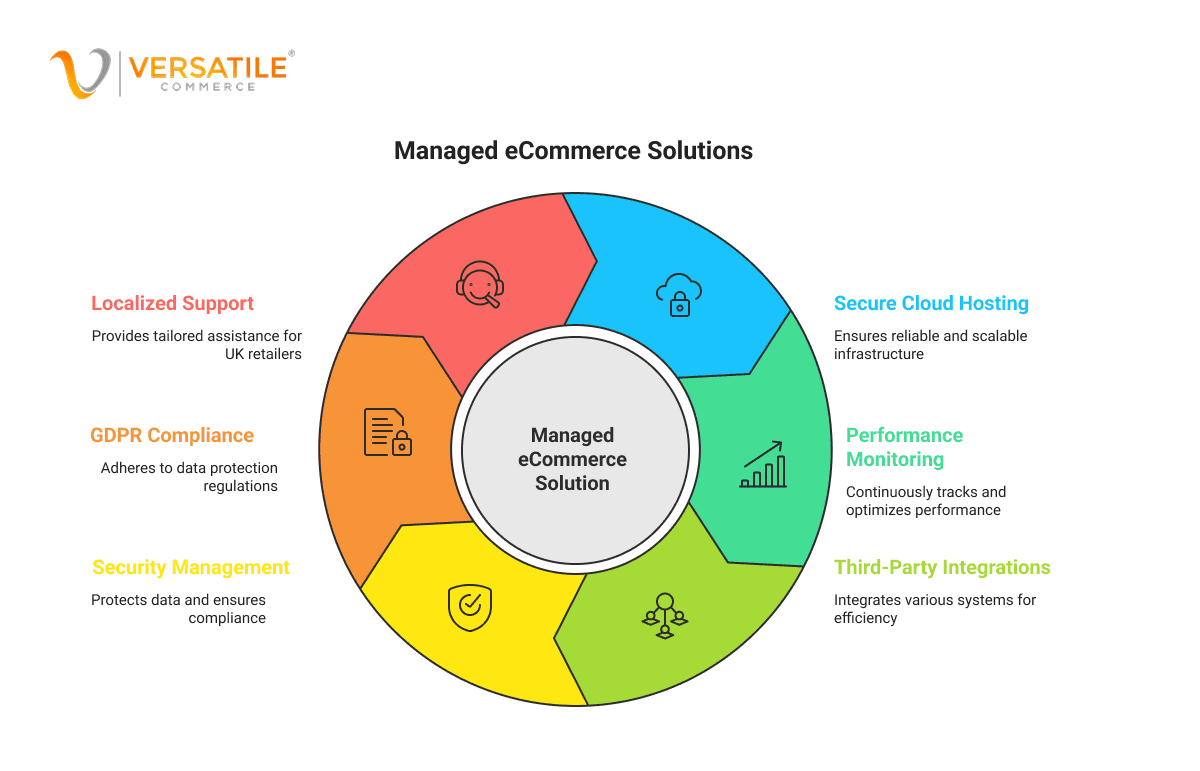
A managed ecommerce solution is a fully outsourced, end-to-end service model that handles the operational, technical, and compliance elements of running an online store. Unlike self-hosted ecommerce platforms, which require retailers to manage everything from server configuration to third-party integrations and ongoing maintenance, ecommerce managed solutions offer a seamless, all-in-one ecosystem.
Instead of navigating a patchwork of plugins, security updates, and fragmented tools, UK retailers can partner with providers that deliver a comprehensive and scalable foundation for digital commerce.
A typical managed ecommerce platform UK retailers adopt includes:
- Secure and scalable cloud hosting
Continuous performance monitoring and updates
Seamless third-party integrations (ERP, CRM, POS systems, marketplaces)
Proactive security management and automated backups
- GDPR compliant ecommerce UK configuration and updates
Localised support and platform optimisation for the UK retail landscape
This structure allows retailers to offload technical burdens and redirect internal resources toward marketing, innovation, and customer experience.
Moreover, the stakes have never been higher. In 2024, the UK is projected to have about 50 million ecommerce users, making non-digital buyers a shrinking minority of the population. Retailers that fail to modernise risk losing relevance in an overwhelmingly digital market.
For businesses aiming to scale efficiently while maintaining regulatory integrity and omnichannel cohesion, ecommerce management services UK providers offer more than convenience; they provide strategic infrastructure. In short, ecommerce managed solutions serve as a cornerstone in any serious retail digital transformation UK initiative.
2. The Complete Growth Platform: What Does It Mean for UK Retailers?
Having an online store is no longer a competitive advantage; it's simply a baseline requirement. The real differentiator lies in adopting a complete growth platform for retailers, a model that goes far beyond the limitations of basic ecommerce tools.
So, what’s the difference between a standard ecommerce tool and a true growth platform? While a basic platform might help you list products, manage checkouts, and launch a store, it often falls short when it comes to performance at scale. On the other hand, a growth platform is designed to power the entire digital retail journey from operations and marketing to compliance and customer experience.
A growth platform integrates six essential pillars:
Scalability: Built to handle traffic spikes, product expansions, and seasonal demand without performance issues.
Omnichannel integration: Unified inventory and customer data across web, mobile, social commerce, and physical stores are core to omnichannel retail solutions in the UK.
Advanced analytics: Real-time data on customer behaviour, sales performance, and operational efficiency
Marketing automation: Campaigns, retargeting, and personalisation at scale are especially critical as the UK marketing automation sector grows from USD 421.1 million in 2024 to USD 889.0 million by 2030.
Compliance-first architecture: Especially for GDPR compliant e-commerce UK mandates, VAT handling, and data storage regulations.
Dedicated support and updates: Continuous platform evolution without added strain on internal teams.
These capabilities don’t just keep your store running; they proactively fuel business expansion, improve customer lifetime value, and reduce the operational bottlenecks that often stall traditional setups.
By choosing a managed ecommerce platform, UK retailers can align with long-term growth imperatives, not just short-term fixes. The result? A tech foundation that empowers retail leaders to move faster, personalise deeper, and scale smarter in an increasingly competitive digital economy.
3. Why Switch? Managed eCommerce vs. Self-Hosted Platforms
For many UK retailers, the initial instinct is to build their e-commerce presence using self-hosted or open-source tools. While this DIY approach offers flexibility, it often has hidden complexities and long-term limitations.
As retail operations grow and customer expectations rise, so do the technical demands like security, compliance, integration, and performance. This is where the shift to a managed ecommerce platform UK becomes not just viable, but vital.
Let’s break it down.
Feature / Aspect | Managed eCommerce | Self-Hosted Platform |
Hosting & Maintenance | Included and handled by provider | Retailer must manage |
Security Updates | Automated & proactive | Manual, error-prone |
Scalability | Elastic, infrastructure-ready | Depends on internal resources |
Compliance (e.g. GDPR, VAT) | GDPR compliant ecommerce UK by default | Must be configured manually |
Third-party Integrations | Pre-tested, supported | Custom setups may be required |
Cost Structure | Predictable (subscription) | Variable; high long-term maintenance costs |
Technical Expertise Needed | Minimal | High |
Time to Market | Fast, streamlined onboarding | Slower, more configuration required |
Self-hosted solutions (like WooCommerce or Magento Open Source) give you full control, but that control comes with the burden of responsibility.
In contrast, ecommerce managed solutions offer a done-for-you experience. These platforms are maintained by a dedicated provider who ensures your store stays secure, compliant, integrated, and up-to-date without operational stress. It’s a smarter choice for UK retailers looking to scale without overextending their teams or compromising compliance. When you factor in hidden maintenance costs, delays, and opportunity loss with self-hosted platforms, the ROI of managed solutions becomes evident.
4. Key Benefits of eCommerce Managed Solutions for UK Retailers
For UK retailers looking to scale ecommerce strategically, here are the five key benefits that make managed platforms the smart choice:
4.1 Save Time and Resources
No more juggling servers, chasing plugin updates, or troubleshooting technical issues. With a managed ecommerce platform UK retailers can offload the entire backend, freeing internal teams to focus on what actually drives growth. This leads to faster launches, leaner operations, and reduced hiring pressure for in-house tech roles.
4.2 Compliance Built-In
The UK’s regulatory environment is unforgiving when it comes to data protection and taxation. A GDPR compliant ecommerce UK solution ensures your store automatically aligns with legal requirements, from cookie handling and data storage to VAT calculations. Compliance becomes part of the system, not a separate risk to manage.
4.3 Seamless Omnichannel Capability
Today’s shoppers expect a consistent experience whether they buy online, in-store, or via social marketplaces. That’s why top omnichannel retail solutions UK are designed to unify inventory, orders, and customer data across every sales channel. Managed platforms make this possible without expensive, custom integrations.
4.4 Enterprise-Grade Security and Payments
Security breaches and payment failures damage both brand trust and bottom lines. eCommerce security for retailers UK is no longer optional; it’s a growth enabler. Managed solutions provide advanced protection with PCI-compliant payment gateways, SSL, threat detection, and auto-updated patches, all without lifting a finger.
4.5 Freedom to Focus on What Matters
Innovation doesn’t happen when your team is buried in technical debt. With integrated e-commerce services UK, you can shift focus to strategy, customer experience, and competitive differentiation. Whether you're personalising journeys or testing new campaigns, your platform won’t hold you back—it’ll power you forward.
5. Omnichannel Retail Solutions & UK Compliance: Must‑Haves for Growth
As UK retailers scale, integrating sales channels and ensuring regulatory compliance quickly moves from “nice to have” to strategic imperative. Let’s explore why these two dimensions, omnichannel and compliance, are inseparable when building a resilient, growth-led retail operation.
5.1 The Omnichannel Advantage
Modern shoppers don’t stick to one path as they hop across online, in-store, social, and marketplace channels seamlessly. In fact, 81% of shoppers begin their purchase journey online, and 73% explore multiple channels before deciding. Retailers who deliver a consistent, integrated experience across all touchpoints see significant rewards, retaining 89% of customers, compared to just 33% for those with siloed operations.
Beyond customer loyalty, omnichannel can drive serious commercial outcomes—options like BOPIS can deliver up to 30% higher order values, and stores that fulfil online orders from physical locations.
5.2 UK‑Specific Compliance
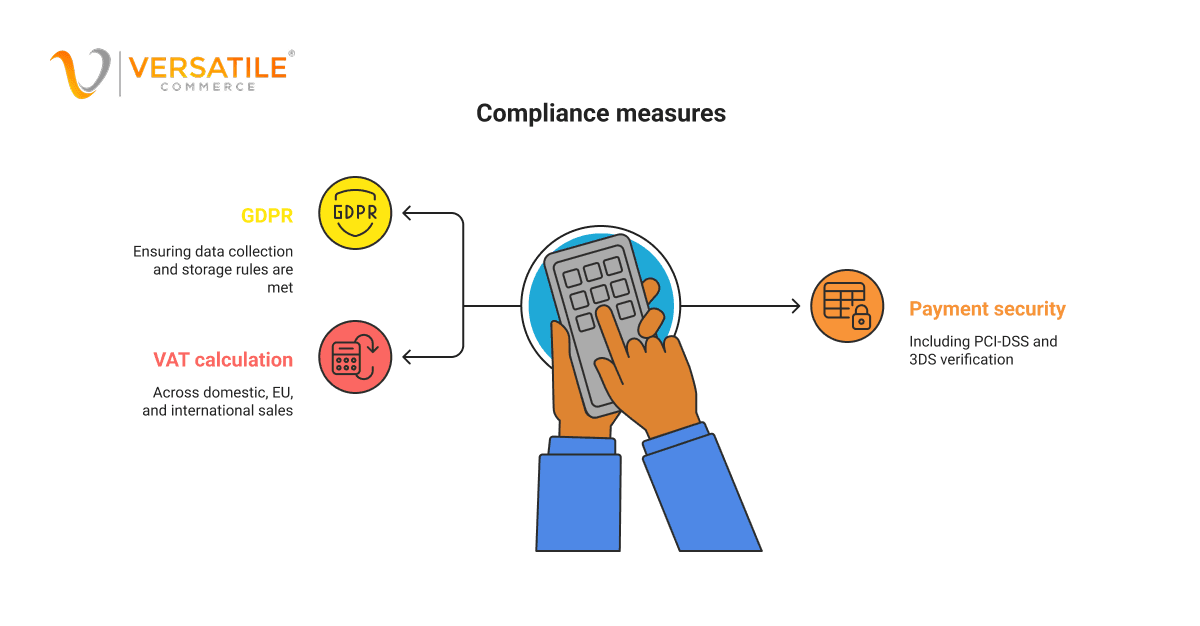
In the UK, omnichannel growth must be paired with stringent compliance measures. Managed platforms can automate:
GDPR – Ensuring data collection and storage rules are met
Payment security – Including PCI-DSS and 3DS verification
VAT calculation – Across domestic, EU, and international sales
5.3 Real-Life Example: B&Q’s In‑Store Fulfilment Strategy
Consider B&Q’s transformation: Since 2020, they’ve converted part of their New Malden store into a mini-fulfilment hub processing about 250 online orders daily. By 2024, 53 of their 315 stores had become “digi-hubs”, handling approximately 85% of online orders.
This strategy not only cuts delivery costs and speeds up pick-up times; it also centralises VAT reporting and helps align payment compliance without burdening internal IT. B&Q’s evolution exemplifies how omnichannel retail solutions UK can boost efficiency, resiliency, and regulatory alignment without adding complexity.
Why This Matters
Customer loyalty: Unified journeys retain more customers.
Revenue uplift: BOPIS and marketplace synergy translate to higher average order values.
Risk minimisation: Automated compliance reduces costly errors.
Operational resilience: Tech-driven agility positions retailers ahead of competitors.
6. Managed eCommerce Costs & ROI: Is It Worth It?
Transitioning to a managed ecommerce platform UK entails costs, and yes, it typically shifts IT spending to a subscription model. But let’s explore the real return on investment for UK retailers, backed by relevant industry data and strategic clarity.
6.1 Transparent, Predictable Costs
With most managed solutions, you enjoy a clear subscription fee that includes:
- Hosting and infrastructure
- Security patches and regulatory updates
- Performance monitoring and uptime guarantees
- Technical support and integrations
6.2 Lower IT Overhead, Higher Focus on Strategy
Rather than allocating budget to server admins, security teams, or plugin developers, managed solutions reinvest those resources into marketing, UX, and customer growth initiatives. As one ROI study found, businesses adopting marketing automation saw a 45% boost in ROI and an 80% increase in lead generation . These gains are only amplified when platform complexity is outsourced.
6.3 Growth-Centric Returns
The UK e‑commerce market is projected to generate:
- £177.11 billion in online sales in 2024, rebounding to its highest point since 2021.
A market value of US$414 million (approx. £330 million) in e‑commerce software revenue by 2025, growing at 5.3% CAGR through 2029.
These figures underscore the critical need to invest: not just to participate but to strategically compete and grow. Managed platforms deliver fast setup, scalability, and operational robustness, allowing retailers to capture their share of this growth curve.
6.4 Long-Term Value Considerations
Analysing true ROI means going beyond subscription fees. Factor in:
Faster time to market, enabling quicker sales and promotional responsiveness.
Reduced cart abandonment and increased order values, due to integrated analytics and optimised UX.
Improved conversion rates, thanks to mobile-first and integrated omnichannel experiences.
Reduced risk through built-in security and compliance measures—preventing costly data breaches and fines.
When It Makes Sense for UK Retailers
This investment aligns strongly when:
Sales volumes are increasing, and infrastructure complexity is stretching internal resources.
You want predictable budgeting to plan for growth.
Compliance, especially GDPR, VAT, and payment security, is a top priority
You're aiming to scale fast while launching new channels, expanding SKUs, or enabling omnichannel
Internal tech resources are limited or better allocated to innovation and marketing
7. How to Choose the Best Managed E-commerce Platform in the UK
The right platform management for ecommerce becomes the engine behind your growth, while the wrong one can create friction, compliance gaps, and integration nightmares.
Here’s how to approach your selection with clarity and confidence.
7.1 Key Criteria to Prioritise
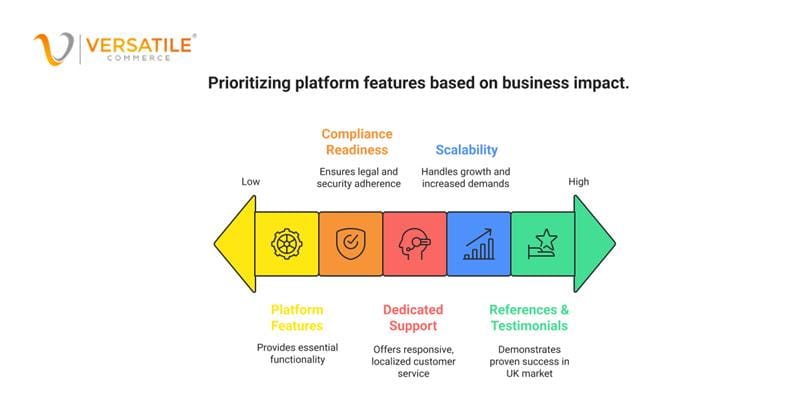
Platform Features: Look for scalability, marketing automation, omnichannel capabilities, analytics, and localisation support for the UK market.
Compliance Readiness: The platform must be inherently GDPR compliant and capable of managing VAT, PCI DSS, and 3DS across regions.
Dedicated Support: Ensure there’s responsive, localised customer service that understands UK retail dynamics.
Scalability: Can the platform handle seasonal traffic spikes, multi-location fulfilment, and product catalogue expansion?
References & Testimonials: Ask for UK-specific case studies or success stories. A platform that claims UK-readiness should have UK-based results.
7.2 Red Flags to Watch For
Not all platforms are built equal, and some warning signs are non-negotiable:
Lack of local support: If there’s no UK-based team or timezone alignment, support delays are inevitable.
Poor integration flexibility: Limited APIs or rigid architecture will block future growth.
Outdated security practices: No SSL, no 2FA, no automated updates? Walk away.
Opaque pricing: Avoid platforms that mask costs in hidden fees, transaction surcharges, or “premium” add-ons that should be standard.
7.3 Smart Retailer Checklist: Questions to Ask Providers
By asking the right questions and watching for subtle red flags, UK retailers can filter out noise and zero in on a solution that drives results. Use this checklist to guide your next vendor conversation:
Is your solution a fully managed ecommerce platform, or does it require in-house resources for updates and maintenance?
How do you ensure GDPR compliant e-commerce UK standards are maintained as regulations evolve?
Do you support omnichannel retail solutions UK, including marketplace integrations and physical store sync?
What analytics and automation capabilities are included out-of-the-box?
Can you share success stories or UK retailer success stories from businesses similar to mine?
What does your ongoing support structure look like (response SLAs, escalation, account management)?
How transparent is your pricing? Are there any hidden bandwidth, order volume, or support fees?

8. Conclusion
With over 50 million digital buyers and rising regulatory complexity, standing still is no longer an option. eCommerce managed solutions offer a clear path forward empowering UK retailers with scalable infrastructure, built-in compliance, and the freedom to innovate without technical burdens. From streamlined omnichannel operations to measurable ROI and faster go-to-market timelines, managed platforms have become a complete growth platform for retailers who are serious about long-term success.
At Versatile Commerce, we’ve helped businesses transform their digital footprint quickly, securely, and sustainably.

